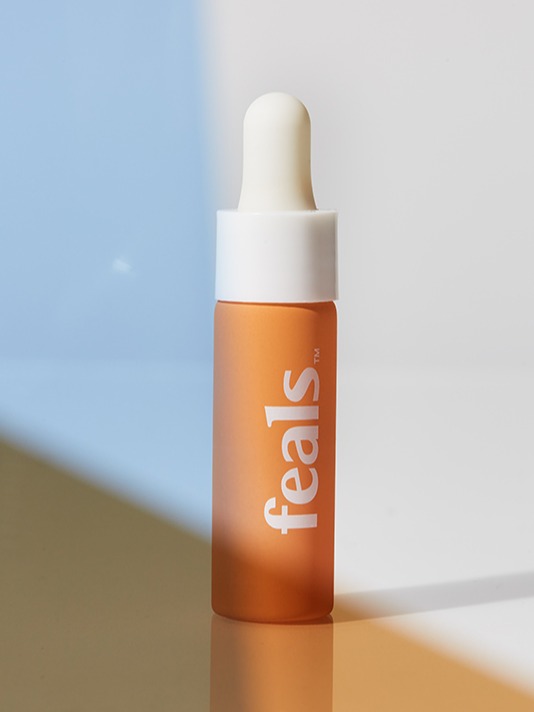There’s nothing worse than waking up to the sound of your alarm blaring, still exhausted, and feeling like you just fell asleep a few minutes ago.
Sleep is an essential function that allows our bodies and minds to recharge. Sleep regulates our metabolism and weight, helps prevent cardiovascular disease, boosts our immune system, promotes mood stability, and improves cognitive function—yet, millions of us aren’t getting enough sleep.
Luckily, there’s plenty of natural options for helping us get our precious sleep, like cannabidiol (CBD) and melatonin. Both of these are widely used to promote restful sleep—but what happens when you take CBD with melatonin?
Here’s everything you need to know about taking CBD with melatonin, including how to work in the body to potentially alleviate sleep troubles and how to work them into your nightly routine.
CBD With Melatonin: What’s the Hype?
So what’s the hype? Why are people taking CBD with melatonin? Currently, there’s not a whole lot of research to support this, but anecdotal evidence suggests that this combination may help promote deep sleep, the third phase of non-REM sleep (the first phase of sleep). In this stage of sleep, your heart rate and respiratory rate slow down, and the brain and body work to repair and recharge.
Clinically-backed research in this space is limited; however, data from a 2022 study assessing the short-term therapeutic effects and safety/tolerability of a natural compound composed of melatonin and CBD found that a CBD-melatonin formula could compete with traditional hypnotic synthetic drugs. Researchers concluded that the antioxidant activity of melatonin offers a further benefit to the brain network, restoring the biological clock functions, while CBD can reduce pain perception, help complete the neuromuscular relaxation, and potentially relieve mild anxiety—together creating a very balanced sensation of wellbeing during sleep.
How Does CBD Potentially Help Promote Restful Sleep?
While more research is needed to fully understand the mechanisms by which CBD may promote restful sleep, anecdotal evidence suggests the benefits may be related to the interaction between CBD and receptors within the endocannabinoid system (ECS). This is important because the ECS plays a key role in the regulation of processes and functions including sleep, mood, inflammatory response and pain, and memory.

Another potential mechanism that may explain the potential sleep benefits of CBD may be linked to the body’s cortisol levels. Cortisol is a steroid hormone responsible for regulating a breadth of integral processes throughout the body, including sleep-wake cycles. In one study, researchers discovered that cortisol levels decreased significantly when subjects took large doses of CBD oil, suggesting that CBD may act as a sedative through its impact on the release of cortisol.
What Is Melatonin and How Does It Work?
Melatonin is a hormone produced and secreted by the pineal gland in your brain in response to darkness. This hormone plays an important role in sleep and the timing of your circadian rhythms (also known as your 24-hour internal clock). So, this hormone essentially tells your body, “okay, it’s time to sleep.”
How To Take CBD With Melatonin
For most melatonin supplements, it’s recommended to take your dose about 20 to 30 minutes before going to bed. For CBD, on the other hand, the time varies depending on how you’re consuming it because of how CBD is metabolized and processed in the body.
In general, oral consumption of CBD (gummies, capsules, beverages, and other edibles) takes anywhere from 45 minutes to two hours to kick in. Sublingual consumption of CBD typically results in a quicker onset of effects, taking anywhere from 15 to 30 minutes to kick in. This method of CBD consumption is accomplished by placing CBD—typically in the form of an oil or tincture—under your tongue, holding it there for 30 seconds, then swallowing it.
So if you’re taking CBD orally with melatonin, this might take a little bit of experimenting to figure out the ideal timing. You might start by taking your CBD edible an hour before bed and the melatonin supplement 30 minutes before bed.
If you’re taking CBD sublingually with melatonin, there’s a bit less guesswork. You can simply take both your melatonin supplement and CBD oil or tincture 30 minutes before bed. Of course, feel free to adjust the timing as you go depending on how long it takes for you to feel the effects.
Determining Your CBD and Melatonin Doses
Over-the-counter melatonin typically comes in 1, 3, or 5 mg doses because the typical adult dose is between 1 and 5 mg. However, if you’re taking CBD with melatonin, it’s best to start on the lower end.
As for CBD, different doses are known to produce different effects. For example, smaller amounts of CBD may act as a stimulant and provide a calming effect and a sense of clear-headedness while larger amounts of CBD may act as a sedative. Additionally, everyone responds differently to CBD and will have their own perfect dose. For CBD, we recommend starting with a lower dose and incrementally bumping it up over time to discover your sweet spot.
Here’s an example of what this experimentation period might look like:

You’re also free to adjust the melatonin dose throughout your experimentation period based on how you’re feeling, but be sure to hold your CBD dose constant. This will help you understand what’s working for you and what’s not. Also, keep in mind that it’s not recommended to take more than 10 mg of melatonin per night.
Feals: A Better Way To Feel Better
At Feals, we believe you deserve a better way to feel better—and sleep better. Our full-spectrum CBD oil and CBD mints are made with only the purest ingredients and are designed to help you find balance and feel at your best.
If you still have questions about taking CBD with melatonin—or just need a bit of guidance on your wellness journey—our customer service team would love to help. Just give them a ring.
To learn more about taking CBD with melatonin or about what Feals can do for you, call our CBD hotline at 844-311-9090 or check out our products today.
These statements have not been evaluated by the Food and Drug Administration. This product is not intended to diagnose, treat, cure, or prevent any disease. This article is for informational purposes only. It is not, nor is it intended to be, a substitute for professional medical advice, diagnosis, or treatment and should never be relied upon for specific medical advice.

